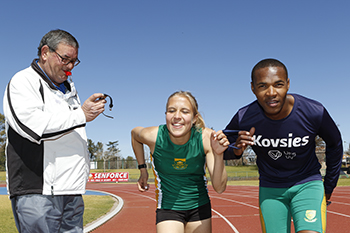Latest News Archive
Please select Category, Year, and then Month to display items
12 October 2020
|
Story Arina Engelbrecht
|
Photo Supplied
 Arina Engelbrecht from Organisational Development and Employee Well-being believes physical activity has a number of benefits for one’s health, including stress relief.
Arina Engelbrecht from Organisational Development and Employee Well-being believes physical activity has a number of benefits for one’s health, including stress relief.
Being physically active plays a big role in preventing the development of mental-health problems and in improving the quality of life of people experiencing mental-health problems.
Treatment for depression
Physical activity can be an alternative treatment for depression. It can be used as a stand-alone treatment or in combination with medication and/or psychological therapy. It promotes all kinds of changes in the brain, including neural growth, reduced inflammation, and new activity patterns are formed that promote feelings of calm and well-being. It releases endorphins – powerful chemicals in the brain that energise your spirit and make you feel good.
Physical activity can be very effective in relieving stress. Research in adults has found that physically active individuals tend to have lower stress levels compared to individuals who are less active. It also leads to improved sleep. When a person sleeps better and feels more rested, overall quality of life improves. They cope better with daily life stressors.
Reduce Alzheimer's risk
Regular physical activity can reduce your risk of developing Alzheimer's disease by up to 50%. It can also slow down further deterioration in those who have already started to develop cognitive problems. It stimulates the brain’s ability to maintain old connections as well as to make new ones.
A study asked people to rate their mood immediately after periods of physical activity (e.g. going for a walk/run, cycling, doing housework) and periods of inactivity (e.g. reading a book or watching television). Researchers found that participants felt more content, more awake, and calmer after being physically active compared to after periods of inactivity.
In conclusion, people who are physically active feel a sense of well-being, feel more energetic throughout the day, sleep better at night, have sharper memories, and feel more relaxed and positive about themselves and their lives.
“Being physically active not only changes your body, it changes your mind,
attitude, and your mood.” – Arina Engelbrecht
UFS Paralympic athlete Louzanne ready for Rio
2016-09-12

Rufus Botha (coach, left), Louzanne Coetzee,
and her guide Khothatso Mokone during a training
session for the Rio 2016 Paralympic Games.
Photo: Johan Roux
“Coetzee is someone with a lot of perseverance. She is becoming a world-class athlete with the help of her guide, Khothatso Mokone.” These were the words from Rufus Botha, the coach of 23-year-old Louzanne Coetzee.
Coetzee, who works at the Institute for Reconciliation and Social Justice at the University of the Free State (UFS), said that the 2016 Paralympics in Rio de Janeiro was never a big dream for her, because she never thought she was good enough to make it, but God had a different plan for her life.
Louzanne and her formidable team
Coetzee said that she still struggles to come to terms with the fact that she is competing at the Paralympics and experiences a rollercoaster of emotions. “I am excited, nervous, and confused all at the same time.”
According to Botha, who has been her coach for the past four years, Coetzee and her guide have such a unique rhythm and work together well. “After Mokone, also a former Kovsie, stepped into the picture, everything just escalated.”
The 2016 Paralympics and beyond
“Coetzee is someone with a lot of
perseverance and is becoming a
world-class athlete.”
“Making the Paralympic team is already a bonus. The next target we are aiming for, is for her to reach the finals in the 1500 m,” Botha said.
Coetzee and Mokone were included in the South African team to participate in Rio from 7 to 18 September 2016. Her heat takes place on 15 September 2016 and the finals of the 1500 m on 17 September 2016.
Coetzee’s main goal after the Paralympics is the World ParaAthletics Championships in London 2017.